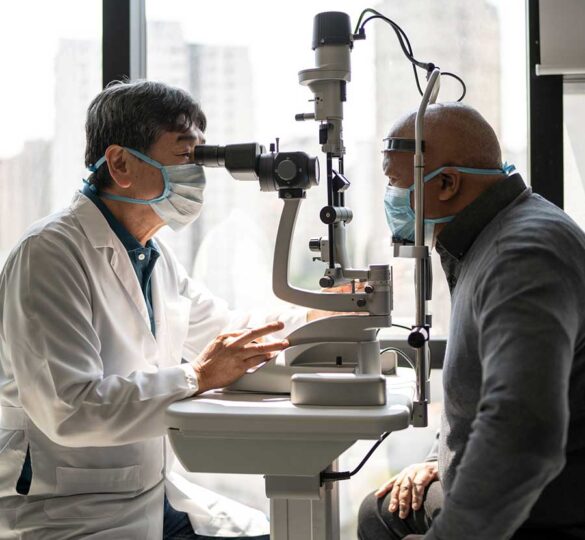Coronavirus Eye Safety

Experts say guarding your eyes — as well as your hands and mouth — can slow the spread of coronavirus.
Here’s why it’s important to protect your eyes during the coronavirus disease 2019 (COVID-19) pandemic, plus how you can help yourself and others.
Coronavirus can spread through the eyes
Coronavirus causes mild to severe respiratory illness. Symptoms such as fever, cough and shortness of breath can show up 2 to 14 days after a person is exposed. People with severe infections can develop pneumonia and die from complications of the illness.
Coronavirus may cause pink eye — but it’s rare
If you see someone with pink eye, don’t panic. It doesn’t mean that person is infected with coronavirus. But health officials believe viral pink eye, or conjunctivitis, develops in about 1% to 3% of people with coronavirus. The virus can spread by touching discharge from an infected person’s eyes.
How to help yourself and others
“It’s important to remember that although there is a lot of concern about coronavirus, common sense precautions can significantly reduce your risk of getting infected. So wash your hands a lot, follow good contact lens hygiene and avoid touching or rubbing your nose, mouth and especially your eyes,” says ophthalmologist Sonal Tuli, MD, a spokesperson for the American Academy of Ophthalmology.
Expect changes to your routine eye exam and procedures
If you’re due for an eye exam, you may be nervous about going to the doctor’s office. Ophthalmologists sit face-to-face with many patients daily. During a slit-lamp exam, the doctor’s face will be just a few inches away from yours. But rest assured that ophthalmologists, like all medical professionals, follow strict hygiene and disinfection guidelines.
If your appointment is postponed, it is important to remain compliant with your medications. Contact your eye doctor if you are running low on your medications.
Other recommendations
- If you wear contact lenses, switch to glasses for a while.
- Wearing glasses may add a layer of protection.
- Stock up on eye medicine prescriptions if you can.
- Avoid rubbing your eyes.
If you feel an urge to itch or rub your eye or even to adjust your glasses, use a tissue instead of your fingers. Dry eyes can lead to more rubbing, so consider adding moisturizing drops to your eye routine. If you must touch your eyes for any reason — even to administer eye medicine — wash your hands first with soap and water for at least 20 seconds.
Posted on April 3, 2020.